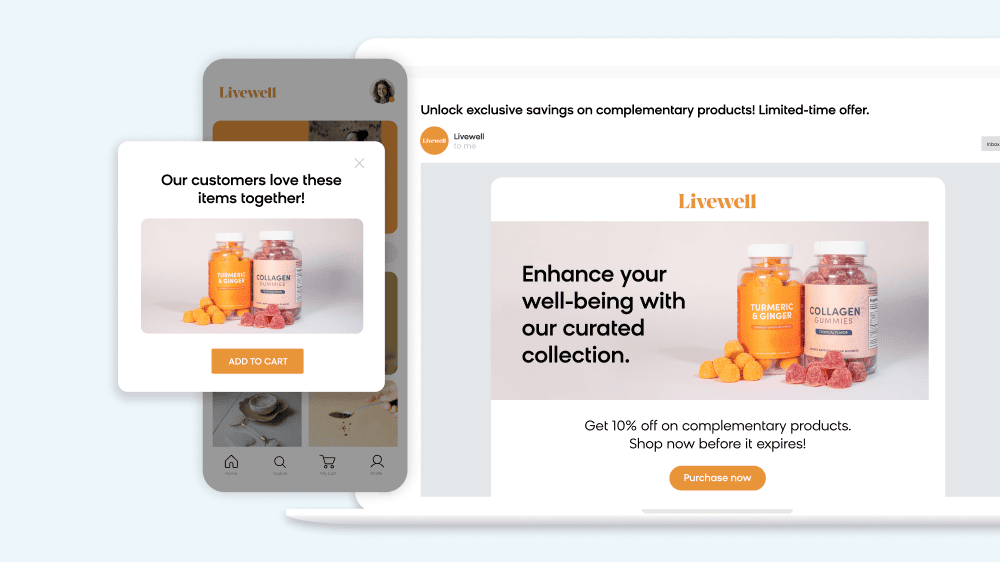By all accounts, everything is going well. Sales are steady, and new customers keep coming back. But what’s next? How can you keep growing your ecommerce brand without overwhelming shoppers or driving them to competitors?
Ecommerce marketers must constantly balance revenue growth with customer experience. Upselling (encouraging shoppers to choose a more expensive product) and cross-selling (suggesting complementary products) are two proven ways to boost average order value (AOV) and retention. However, while these strategies are easy to fulfill in small doses, scaling them effectively is a challenge.
That’s where conversational AI comes in. With real-time, personalized interactions across your site, conversational AI makes upselling and cross-selling feel seamless for even the largest ecommerce brand — no pushy tactics needed. Keep reading to learn how conversational AI does this without making customers feel pressured.
What Is Conversational Shopping in Ecommerce?
Conversational shopping is when AI steps in to assist customers during their online shopping experience. Using natural language processing (NLP) and machine learning, AI agents offer personalized product recommendations, answer questions, and guide shoppers through their journey in a more interactive way.
Examples of Conversational Shopping
- Let’s say a customer is searching for a new sofa, but they’re not sure where to start. A conversational shopping agent can ask the right questions to better understand the customer’s preferences (color, material, size, style, etc.), then share a curated selection of recommendations for them to dig into.
- If a customer is looking between two different items in the same category, the AI agent can proactively provide guidance, answering questions and helping them narrow down their selection instead of letting them go down a rabbit hole of product pages.
- For more expensive purchases (where cart abandonment rates might be higher), the conversational agent can answer any final questions during checkout to help convince the shopper to finalize their purchase.

Why It Matters for Modern Ecommerce
Customers expect quick and meaningful interactions. Conversational shopping delivers this by combining the best elements of in-store experiences with the convenience of online shopping. Unlike generic recommendations that don’t take individual preferences into account, AI-driven shopping assistants adapt to your customers’ needs in real time. They can analyze past shopping habits and in-the-moment responses to suggest items they’re likely to buy.
How It Enables Upselling and Cross-Selling
Conversational AI uses real-time customer data to understand preferences and shopping behaviors. By looking at purchase history, browsing history, and even what shoppers are doing in real time, AI can suggest additional products that match their interests. This creates seamless upselling and cross-selling opportunities that feel natural rather than pushy.
Consider a customer buying a professional camera. Conversational AI might suggest a complementary lens or memory card. In a chat, if the shopper asks about warranty or insurance options, the AI could proactively offer an extended warranty plan or similar protection. In both cases, AI provides helpful suggestions that enhance the shopping experience and boost sales.
Benefits of Using Conversational AI for Upselling and Cross-Selling
Upselling and cross-selling strategies have a reputation for being aggressive, but conversational AI changes that. It delivers well-timed, tailored recommendations that feel more like great customer service than a sales pitch. Here are three ways conversational AI can help boost sales while building stronger customer loyalty:
Higher Average Order Value (AOV)
The more relevant a recommendation, the more likely a customer is to add it to their cart. Instead of making generic suggestions that customers aren’t interested in, conversational AI can use data-driven insights to suggest products that feel like a natural fit. That’s why effective cross-selling techniques can increase sales by 20% and profits by 30%. They offer value, not just additional items.
Imagine that your customer wants to buy a new sofa. AI can suggest a matching ottoman, a set of decorative pillows, or related items that complete the look. Or, if someone is browsing for a dining table, it might recommend a set of chairs in a complementary style and with the right dimensions. These aren’t just upsells; they’re helpful nudges that enhance the shopping experience while increasing average order value.

Improved Customer Retention
Shoppers are more likely to return when they feel understood by your brand. Nearly 80% of consumers prefer to buy from brands they feel connected to, and 57% are likely to spend more with those brands as well. AI-driven recommendations help strengthen customer loyalty and repeat business by learning what customers like and adjusting suggestions to match.
For instance, if a shopper regularly buys specialty coffee, an AI-powered assistant might advocate for a new roast that matches their flavor profile or suggest a subscription plan so they never run out of their favorite blend. In a chat window, AI can answer brewing questions and share resources or suggest a milk frother for those who love lattes — all in a way that feels genuinely helpful. These small, thoughtful interactions build trust, making your existing customers more likely to make repeat purchases with your brand instead of shopping with a competitor.
Scalability for Enterprise Ecommerce
If you run a large ecommerce business, you’re faced with unique challenges — one of the biggest being how to scale upselling and cross-selling without losing that all-important personal touch. Conversational AI makes it easy to automate the process, delivering personalized suggestions to every customer, no matter how many products or transactions are happening at once.
Take a fashion retailer, for example. Conversational AI can instantly suggest shoes or accessories to complete an outfit. Without conversational AI, those recommendations may become more generic as you scale up. With AI, brands can offer high-quality recommendations to thousands (or even millions) of shoppers at the same time while keeping the experience smooth and engaging for everyone.
How Conversational AI Enhances Customer Interactions
Today’s shoppers want to feel like your brand is paying attention to what they need. When retailers don’t offer personalized recommendations, it’s easy for them to feel ignored. Luckily, conversational AI steps in to solve this with three clear benefits for your business: real-time personalization, proactive engagement, and consistent experiences across all channels.
Real-Time Personalization
Online shopping is all about convenience. Over 70% of shoppers say that convenience is the number one reason why they shop online. This outpaces other factors like saving time (57%) and finding better prices (47%).
Conversational AI takes this convenience a step further by personalizing the experience in real time. It uses context clues to offer dynamic recommendations that are relevant in the moment. For example, if a customer is browsing your online store for skincare and engages with conversational AI, the AI can look at in-session customer behavior and previous data to make the best recommendations. Maybe the customer has been looking at organic products in a certain price range — the conversational AI will keep that in mind and show the right products.
Proactive Engagement
It’s a frustrating scenario when a shopper fills their cart before abruptly leaving your website without checking out. In these moments, it’s tough to know what went wrong or how to bring them back. But the sale doesn’t have to slip through your fingers. Conversational AI can help.
Rather than waiting for customers to start browsing, conversational AI can engage the customer during the checkout process to see if they have any questions or concerns it can address. This is especially useful for larger or more complex purchases, as this last-minute guidance can help ease any hesitations and convince the customer to purchase.
If they still abandon their shopping cart but return to your site later, conversational AI can reengage them and see if they’re still interested or need any further help. From here, the AI can suggest a related product or even offer a discounted price to encourage them to complete the checkout. AI can also provide product recommendations based on their past purchases or browsing behavior. This way, conversational AI gets to know your shoppers’ preferences and can suggest relevant products.
Omnichannel Consistency
Imagine you’re loyal to a footwear brand and have three places to shop: a brand store, a department store, and a discount retailer. The shoes may be the same, but the shopping experience is different: personalized at the brand store, white-glove service at the department store, and more basic at the discount retailer.
Conversational AI ensures that every single interaction is consistent and personalized, whether your shopper is using chatbots, email, social media, or another platform entirely. It remembers your shoppers’ history and assists them based on their preferences, driving increased customer satisfaction and boosting customer engagement at every interaction.
Strategies for Implementing Conversational AI in Upselling and Cross-Selling
Conversational AI opens the door to smarter upselling and cross-selling by offering timely, personalized recommendations. Here’s how you can implement it effectively.
Identifying Upselling and Cross-Selling Opportunities
Upselling strategies can significantly boost your bottom line, but it can be tricky to identify the right moment to suggest an upsell. Suggest it too early, and your shopper is turned off. Suggest it too late, and you’ve missed your opportunity entirely.
AI is a tremendous help because the technology can analyze customer purchase patterns, browsing behavior, and past interactions to pinpoint the best upselling techniques. By picking up on key signals, businesses can offer upgrades or premium options exactly when the customer is most likely to go for it.

Conversational AI tools are also crucial for cross-selling, finding the products each consumer is most likely to add on based on past purchase behavior and current customer engagement. For example, based on where a shopper is in the customer journey, AI can suggest bundling complementary products (in the same style or brand) as their recent purchase.
Building Dynamic Recommendation Engines
As great as it would be to have a real salesperson available 24/7 across every channel, it’s just not practical. Luckily, conversational AI can step in and do the job just as well.
AI works around the clock, helping ecommerce brands nail product recommendations in every setting. These recommendation engines adjust in real time to align with each customer’s unique preferences, analyzing everything from casual browsing habits to purchase history.
Integrating AI With Existing Tools
Your AI tool can deliver incredible results, but it won’t have much impact across your company unless it integrates seamlessly with your existing tech stack. Without easy integration with other key systems like your CRM and ecommerce platforms, it’s hard to align your AI with your larger goals.
When your AI connects to these tools, you can tap into existing insights for a smoother, more personalized shopping experience across all touchpoints. This improves customer satisfaction and helps your team make smarter decisions with real-time data. With a better understanding of customer preferences, you can fine-tune marketing efforts and increase revenue.
Using Bloomreach Clarity To Transform Upselling and Cross-Selling Opportunities
Great ecommerce marketing is all about knowing what customers want — sometimes before they do. Bloomreach Clarity provides AI-powered customer insights that help marketers move beyond static product pages or even the search bar. Clarity steps in at the right moment — whether your customer’s on a product listing page, the checkout page, or searching for something — to personalize the shopping experience and provide tailored assistance.
As a powerful AI agent, Clarity can engage in human-like conversations that guide shoppers to the right products. Clarity can streamline the shopping experience by answering questions, comparing options, and suggesting complementary items. It’s like having a top-tier sales team ready to assist everyone who stops by.
The result is an experience that feels effortless for all of your shoppers, no matter how many you have, while giving your brand more control over how you engage and convert visitors in real time. With instant responses and adaptive learning, Clarity drives higher RPV and conversion rates. More importantly, it turns casual browsers into repeat buyers by making every interaction smooth, efficient, and worthwhile.
Drive Ecommerce Growth With AI-Powered Conversational Shopping
In the past, upselling and cross-selling efforts felt inauthentic, often targeted more toward increasing sales than helping customers. Conversational AI changes that by making product recommendations feel helpful and natural. This helps brands connect with shoppers in meaningful ways, boosting engagement, conversions, and customer lifetime value along the way.
Bloomreach Clarity offers AI-driven insights and natural interactions that make online shopping easier. It helps ecommerce businesses recommend the right products, simplify shopping, and boost revenue while building strong customer relationships. Without it, you’re missing out on the opportunity to provide the seamless, personalized experience today’s shoppers expect.
Bring the power of conversational shopping to your site today — learn more about Bloomreach Clarity.














